新版开心英语六年级下册课本内容复习【短语句型全覆盖】
完整word版,新版开心英语六年级下册内容复习【短语句型全覆盖】

新版开心英语六年级下册课本内容复习<短语句型全覆盖>Unit1:A Parade Day单词过关:原形:use study play visit run talk jump clean 过去式:___ ______ ______ _____ _____ _____ _______ _____1.sang and dance2.saw a parade3.played basketball4.played the drum5.visited HongKong6.cleaned my room7.watched TV8.talked to friends9.studied English 10.cooked breakfast 11.called my friends12.looked after the children 13.thanked us a lot 14.wrote a diary句型过关:What did you do yesterday? I played basketball.What did Lisa do yesterday? She played the piano.What die you do the day before yesterday? I played basketballthen,too.What did you do in the parade? I played the trumpet/drum/flute/violin/piano. Where did you go last weekend? (last night/last Sunday)I went swimming with my friends.How did you do to Beijing? I went there by plane.Unit2:A Magic Day单词过关:原形:go eat write read make ride sing drink过去式:___ ______ ______ _____ _____ _____ ______ _____ 1.washed my face 2.brushed my teeth 3.ate breakfast/lunch/dinner/supper4.went to work5.went to school6.rode my bike to school7.came/went home8.took the school bus9.wrote and read in English 10.practiced the piano11.ate cookies and drank milk 12.took some photos 13.gave me some water 14.went on a trip 15.played in the rain 16.learned to dance 17.flew to France句型过关:What did you do this morning? I read a book.What did Jenny(she/he) do last night? She/He watched TV/studied for 2 hours. What did Gogo do on Monday morning? He went to the swimming pool.What did you eat this morning? I ate cheese,chocolate,chicken,and ice cream.Did you drink anything this morning? No,I didn’t. I’m thirsty now.Did you go to the beach? No,I didn’t.I went to the park.Did Tony(he/she) go shopping yesterday? Yes,he/she did. No,he/she didn’t.Did your father ride a horse last Saturday? Yes,he did./No,he didn’t.Unit3:A Lucky Day单词短语过关:1.won(win) the game2.ate(eat) some cotton candy3.had(have) fun with friends4.got(get) a gift 7.woke(wake) up late 8.missed(miss) the bus 9.forgot(forget) my homework 10.lost(lose) my keys 11.had a great day 12.woke up early 13.wrote a book/an article 14.talked about her life 15.read this book16.became deaf and blind 17.could not hear or see 18.helped her to talk19.learned to write/read 20.nineteen months old句型过关:What happened? I had a lucky/great/ happy/bad/funny day.What happened to the girl? She woke up late this morning.What happened to Xiaohui yesterday? She didn’t have breakfast.First, I had fun with my friends.Next, I won the game.After that, Igot a nice gift. Wow, You’re really lucky.What happened(to you)?/What’s wrong(with you)?/What’s the matter (with you)? What a great day!/How great(the day is)!Yesterday was a bad day for me!I had a good and bad day.Review1:1.lost his keys2.had a cold3.woke up early4.went to the beach5.rode a bike6.read a book7.played tennis8.studied English/Chinese/Japanese9.cleaned up the window 10.drank some juice 11.sang songs 12.got a nice gift 13.had fun with friends 14.won the game 15.wrote a letter to her friends 16.played his toy car 17.had a cold/fever 18.played the violin 19.went home at eleven o’clock 20.ate some salad 21.watered the flowers 22.swept(sweep)the floor 23.helped Dad wash the car 24.worked on a farm 25.a big wolf jumped out Where did you go last Sunday? I went to the park.What did you do? I had fun with friendsLast Sunday,I went to the park. First, I rode my bike. Next, I played tennis with friends. After that, I flew(fly) kites with them.Unit4:Felling Excited单词短语过关:tired scared excited sad happy bored interested outgoing angry1.stayed up late2.heard a noise3.got a kitten4.got a poor/good grade5.stayed in bed6.stayed up late7.watched a football game8.saw a mouse9.missed the subway 10.washed the clothes 11.went into the living room12.was scared 13.wasn’t scared at all 14.was excited and hungry 15.walked to the kitchen 16.wanted some milk and cookies 17.looked around18.a red and white hat 19.was tired 20.Christmas day 21.lost my cat22.came out 23.climbed up the mountain 24.sat in my plane 25.flew up to cloud 26.visited the Panda Base in Sichuan 27.saved the pandas 28.take care ofUnit5:Being Helpful单词短语过关:1.turn on the light(s)2.turn off the TV/computer3.turn down the radio4.put away your books5.take out your notebook6.take out the trash7.put on your jacket8.put off your coat 9.try on .hang up your clothes 10.hang up your clothes 11.clean up the room 12.clean them up later/in a minute 13.take it out 14.be proud of 15.put away your toys (put them away)for you 16.washing the dishes 17.sweeping the floor 18.cleaning up my room 19.watering the plants 20.keep your room tidy 21.put away your shoes22.clean things up before we go 23.not any more 24.put the trash in a bag.25.take it outsidemy/your/his/her/its/our/their/yourright now in a minute at once later just now句型过关:Can you take out the trash,please? Sure,I’ll take it out. I’m proud of you.Can you hang up my clothes? Sure,I’ll hang them up in a minute/right now/at once. Oh,Gogo,I’m proud of you.Can you clean up my room,please? Sorry.I’m busy now.It’s time to clean up.=It’s for cleaning up.It’s time to have lunch.=It’s for lunch.Where should I put this cup? Put it on the table.Which one do you like? The red one.How/What about the pencil? How/What you?What do you want me to do with that paper over there?You can throw it away.I don’t need it any more.Unit6:Feeling Fun单词短语过关:原形:lose carry push pull give find drop get过去式:____ ______ ______ _____ _____ _____ _______ _____ 1.lost my bag/cheese 2.don’t worry 3.hurry up 4.can’t go out 5.will come back soon 6.must be careful 7.dangerous/safe 8.drop your club 9.don’t fight 10.be afraid of 11.our play is over 12.dropped my bag 13.pushed my horse 14.go forward 15.go back 16.Tangseng /Monkey King /Pigsy /Sandy 17.White-Bone Monster 18.go the West 19.came to a big mountain20.were hungry and thirsty 22.drew a magic circle 23.on the ground24.went away for food 25.turned into a pretty girl 26.leave the circle27.at that moment 28.didn’t give up 29.so that 30.poured a cup of tea 31.a long journey to the West 32.many years ago 33.get some important books 34.bring(brought) them back to China 35.made problems gor him 36.in the end 37.learnd from Tangseng 38.worked very hard 39.help me a lot40.everyone got some very special presents 41.studied many books and he was very wise 42.watched me 43.climbed a tree 44.jumped on the car 45.played with me 46.across from句型过关:Oh,no! I lost my bag! I can’t find it. Don’t worry. I’ll help you.We must hurry up. Oh,no!We can’t go out. Don’t push.You must pull!What must she do? She must find her dog.What will she do? She’ll find her keys.(she’ll=she will)What is she doing? She is pulling the dog.What happened? She got a present from her parents.Where is the chair? The chair is on the stairs.Review2:1.did my homework2.went to the park3.stayed up late4.watched TV5.heard a noise6.saw a snake7.saw a dentist8.saw a movie9.got a poor grade 10.lost my keys 11.had a cold 12.dropped my glasses 13.got a good grade 14.won the game 15.got a present 16.went on vacation 17.had a birthday party 18.played computer games 19.had fun with friends20.played basketball/football/soccer/volleyball/badminton/tennis/ping-pongHe ‘s scared because he saw a snake.He must pull the door.Can you help me fold the clothes?He’s going to wash the dishes.Can you take out your notebook?How did you feel last weekend? I was tired.What did you do? I played basketball and stayed up late.。
开心学英语六年级下册重点单词和重点句型

Book8Unit 1:Where did you buy that hat?重点词组:1.a box of chocolates一盒巧克力2.a loaf of bread一条面包3.a carton of milk一盒牛奶4.a can of cola一罐可乐5.a tube of toothpaste一管牙膏6.a pack of cards一副扑克牌7.a bunch of flowers一束花8.a pair of sunglasses一副太阳镜9.grcery store食品杂货店 10.supermarket超级市场11.shopping mall购物中心Sounds and words:1.cl own小丑2.cl ock闹钟3.cl othes衣服4.gl ass玻璃5.gl ue胶水6.gl oves手套重点句子:(Target)1.Where did you buy those shoes?你在哪里买那些鞋子?I bought them at the shopping mall?我在购物中心买的。
2.How much were they?它们要多少钱?They were 25 yuan.它们要25元。
That’s cheap.那便宜。
3.Where did you buy that hat?你在哪里买那顶帽子?I bought it at the grocery store. 我在食品杂货店买的。
4.Was it expensive?它贵吗? No, it was cheap.不,它便宜。
Unit 2:Turn left at the corner.重点单词、词组:1.turn left向左转2.turn right向右转3.go straight直走4.across from在…对面5.street街道6.traffic light交通灯7.corner拐角,角8.bus stop公共汽车站9.cross 穿过10.Excuse me对不起,打扰了,请原谅 11.block街区12.Pardon me对不起,打扰了,请原谅 13.hamburger 汉堡包14.history museum历史博物馆 15.statue雕像 16.crosswalk人行道Sounds and words:1.cr eam奶油2.cr ab蟹3.cr ocodile鳄鱼4.gr ass草5.gr apes葡萄6.gr ocery store食品杂货店重点句子:(Target)1.Excuse me. Where’s the bank?请问,银行在哪里?Turn left at the corner. 在拐角向左转。
开心学英语六年级下册综合复习-语法总结.doc
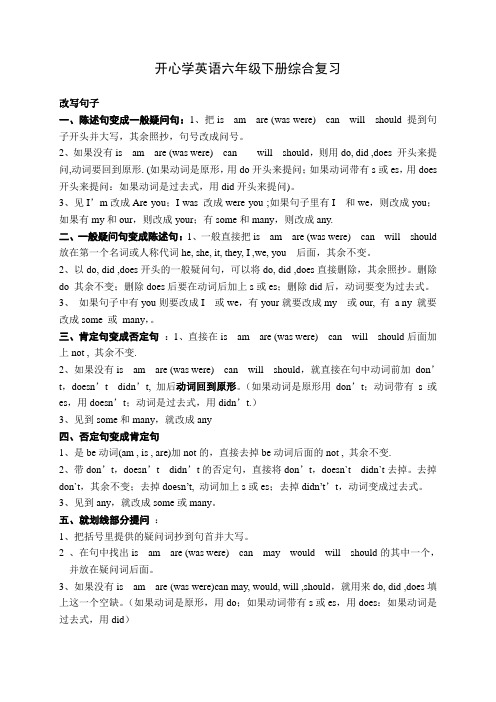
开心学英语六年级下册综合复习改写句子一、陈述句变成一般疑问句:1、把is am are (was were) can will should 提到句子开头并大写,其余照抄,句号改成问号。
2、如果没有is am are (was were) can will should,则用do, did ,does 开头来提问,动词要回到原形. (如果动词是原形,用do开头来提问;如果动词带有s或es,用does 开头来提问:如果动词是过去式,用did开头来提问)。
3、见I’m改成Are you;I was 改成were you ;如果句子里有I 和we,则改成you;如果有my和our,则改成your;有some和many,则改成any.二、一般疑问句变成陈述句:1、一般直接把is am are (was were) can will should 放在第一个名词或人称代词he, she, it, they, I ,we, you 后面,其余不变。
2、以do, did ,does开头的一般疑问句,可以将do, did ,does直接删除,其余照抄。
删除do 其余不变;删除does后要在动词后加上s或es;删除did后,动词要变为过去式。
3、如果句子中有you则要改成I 或we,有your就要改成my 或our, 有a ny 就要改成some 或many,。
三、肯定句变成否定句:1、直接在is am are (was were) can will should后面加上not , 其余不变.2、如果没有is am are (was were) can will should,就直接在句中动词前加don’t,doesn’t didn’t, 加后动词回到原形。
(如果动词是原形用don’t;动词带有s或es,用doesn’t;动词是过去式,用didn’t.)3、见到some和many,就改成any四、否定句变成肯定句1、是be动词(am , is , are)加not的,直接去掉be动词后面的not , 其余不变.2、带don’t,doesn’t didn’t的否定句,直接将don’t,doesn`t didn`t去掉。
广东版开心英语六年级下册unit1知识点(可编辑修改word版)

Unit 1:Where did you buy that hat?(一)重点词组:1.a box of chocolates2.a loaf of bread3.a carton of milk4.a can of cola5.a tube of toothpaste6.a pack of cards7.a bunch of flowers 8.a pair of sunglasses9.grocery store 10.supermarket11.shopping mall 12.of course 当然e on 加油,来呀(二)重点词汇1.cl own 小丑2.cl ock 闹钟3.cl othes 衣服(复数)4.gl ass 玻璃5.gl ue 胶水6.gl ove 手套7.look 看起来8.think 想9.let 让10.cheap 11.expensive 12.cool 凉快的,酷的二、知识点学习:(1)Where did you buy those shoes?你在哪里买那些鞋子?这个句子中,有一个动词能够指明句子的时态,这个动词是(did/buy)为什么是这个词呢?因为did 是do/does 的(过去式/原形),所以这个句子是(一般现在时/一般过去时/现在进行时)。
下面我们来看看一般过去时与一般现在时的区别I bought an AK-47 yesterday. 时间状语是“昨天”I usually buy an AK-47 in CF. 时间状语是“经常”练习:a.将上面的句子改为一般现在时b.()-I a game card last night.-Really(真的吗)?Where did you it-I bought it in a grocery store,so my mother will not know it-Wow,I often it through my classmates(同学),then(那样)my parents will not know,haha!A.bought;bought;boughtB.bought;buy;buyC.buy;buy;bought【拓展延伸】常见不规则动词的过去式:am/is—was;are—were;do/does—did;go—went;buy—bought;bring—brought;think—thought:have/has—had;eat—ate(2)—Was it expensive?它贵吗?—No, it was cheap.不,它便宜。
六年级下开心英语知识点
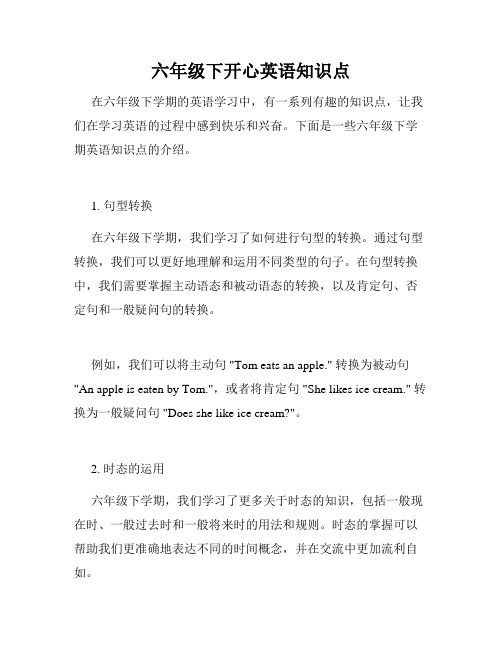
六年级下开心英语知识点在六年级下学期的英语学习中,有一系列有趣的知识点,让我们在学习英语的过程中感到快乐和兴奋。
下面是一些六年级下学期英语知识点的介绍。
1. 句型转换在六年级下学期,我们学习了如何进行句型的转换。
通过句型转换,我们可以更好地理解和运用不同类型的句子。
在句型转换中,我们需要掌握主动语态和被动语态的转换,以及肯定句、否定句和一般疑问句的转换。
例如,我们可以将主动句 "Tom eats an apple." 转换为被动句"An apple is eaten by Tom.",或者将肯定句 "She likes ice cream." 转换为一般疑问句 "Does she like ice cream?"。
2. 时态的运用六年级下学期,我们学习了更多关于时态的知识,包括一般现在时、一般过去时和一般将来时的用法和规则。
时态的掌握可以帮助我们更准确地表达不同的时间概念,并在交流中更加流利自如。
举例来说,我们可以用一般现在时描述日常的习惯和经常发生的动作,如 "I often go to the park on weekends.";用一般过去时表达过去发生的动作或事件,如 "She watched a movie last night.";用一般将来时表示将来要发生的动作,如 "We will have a party next Sunday."。
3. 阅读理解在六年级下学期,我们开始进行更深入的阅读理解训练。
通过阅读不同类型的文章,包括短文、对话和故事,我们可以提高阅读理解和语言理解的能力。
在阅读理解中,我们需要仔细阅读文章内容,理解关键信息,并回答相关的问题。
阅读理解的练习可以帮助我们提高阅读速度和理解能力,并扩大我们的词汇量。
同时,通过阅读理解活动,我们还可以了解不同的文化背景和常识知识。
六年级下册英语复习提纲-短语+句型
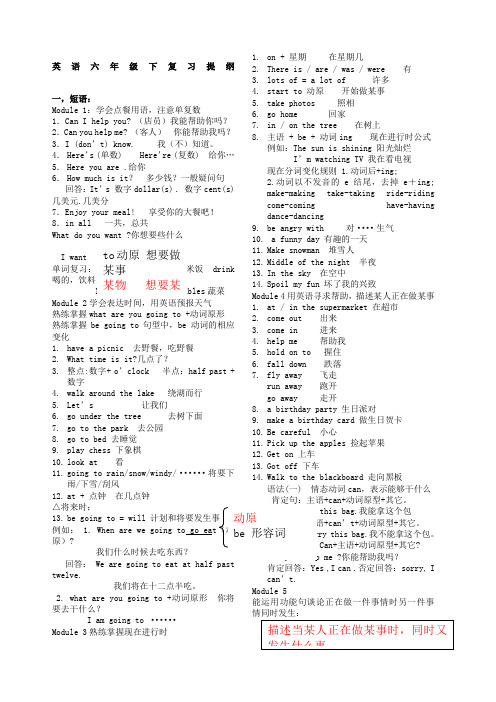
英语六年级下复习提纲 一,短语: Module 1:学会点餐用语,注意单复数 1.Can I help you? (店员)我能帮助你吗? 2.Can you help me? (客人) 你能帮助我吗? 3.I (don ’t) know. 我(不)知道。
4. Here ’s (单数) Here ’re (复数) 给你… 5. Here you are .给你 6. How much is it ? 多少钱?一般疑问句 回答:It ’s 数字dollar(s) . 数字cent(s) 几美元.几美分 7.Enjoy your meal! 享受你的大餐吧! 8.in all 一共,总共 What do you want ?你想要些什么 I want 单词复习:chicken 鸡肉 rice 米饭 drink 喝的,饮料 Noodles 面条 vegetables 蔬菜 Module 2学会表达时间,用英语预报天气 熟练掌握what are you going to +动词原形 熟练掌握be going to 句型中,be 动词的相应变化 1. have a picnic 去野餐,吃野餐 2. What time is it?几点了? 3. 整点:数字+ o ’clock 半点:half past + 数字 4. walk around the lake 绕湖而行 5. Let ’s 让我们 6. go under the tree 去树下面 7. go to the park 去公园 8. go to bed 去睡觉 9. play chess 下象棋 10. look at 看 11. going to rain/snow/windy/······将要下雨/下雪/刮风 12. at + 点钟 在几点钟 △将来时: 13. be going to = will 例如: 1. When are we going to go eat 原)? 我们什么时候去吃东西? 回答:twelve. 我们将在十二点半吃。
开心版六年级英语下册课本单元知识点练习
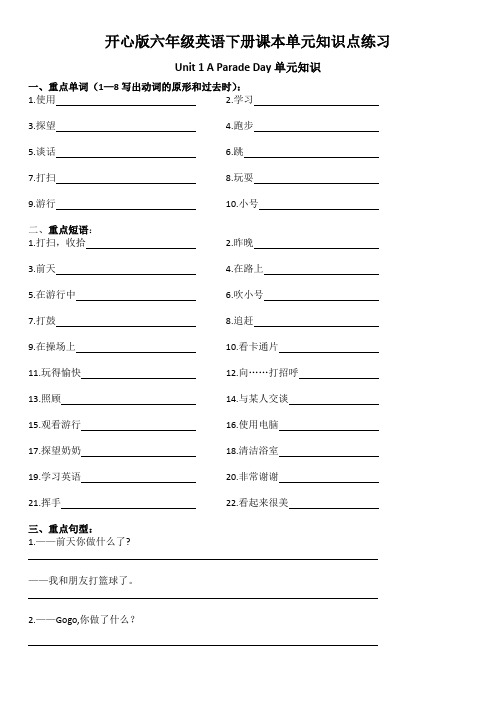
开心版六年级英语下册课本单元知识点练习Unit 1 A Parade Day单元知识一、重点单词(1—8写出动词的原形和过去时):1.使用2.学习3.探望4.跑步5.谈话6.跳7.打扫8.玩耍9.游行10.小号二、重点短语:1.打扫,收拾2.昨晚3.前天4.在路上5.在游行中6.吹小号7.打鼓8.追赶9.在操场上10.看卡通片11.玩得愉快12.向……打招呼13.照顾14.与某人交谈15.观看游行16.使用电脑17.探望奶奶18.清洁浴室19.学习英语20.非常谢谢21.挥手22.看起来很美三、重点句型:1.——前天你做什么了?——我和朋友打篮球了。
2.——Gogo,你做了什么?——我跟在游行队伍后面看。
3.——Jenny在游行队伍做了什么?——她和Lucy吹小号。
4.他希望有一天能看到米奇和米妮。
5.他玩得很开心!6.多么兴奋!7.我看到一个聪明的小丑拿着一个干净的钟。
8.那儿每天有100000人!9.我和他们聊天,逗他们笑。
10.回来游玩真是太好了!11.上周日,在去公园的路上我看到了一个游行队伍。
Unit 2 A Magic Day 单元知识一、重点单词(1—8写出动词的原形和过去时):1.去2.吃3.写4.读5.制作6.骑7.唱8.喝9美丽的10.沙漠11.觉得12.鸡肉15.口渴的16.灯17.水18.饥饿的二、重点短语:1.神灯2.一瓶水3.读书4.去沙滩5.写一封信6.制作模型7.骑自行车8.唱一首歌9.喝水10.洗脸11.坐校车12.刷牙13.练习钢琴14.繁忙的一天15.吃早餐16.去上班17.拍照18.玩游戏19.去旅游20.去太空21.等待她22.待在太空三、重点句型:1.——今天早上你喝东西了吗?——没有,我没喝。
2.——今天早上你做什么了?——我读书了。
3.——昨天你在音乐课做什么?——我和同学唱歌和跳舞。
5.我骑自行车去上学,但是珍妮乘校车。
6.游乐园里有很多很酷的东西!7.当我们回到家,我们吃饼干、喝牛奶。
开心英语六年级下册知识点
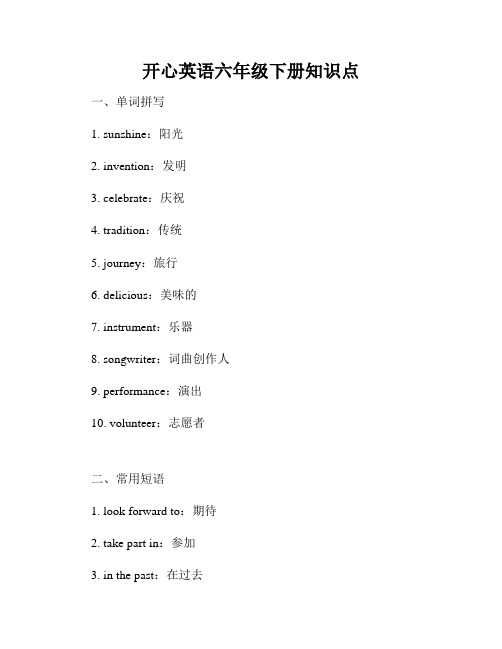
开心英语六年级下册知识点一、单词拼写1. sunshine:阳光2. invention:发明3. celebrate:庆祝4. tradition:传统5. journey:旅行6. delicious:美味的7. instrument:乐器8. songwriter:词曲创作人9. performance:演出10. volunteer:志愿者二、常用短语1. look forward to:期待2. take part in:参加3. in the past:在过去4. have fun:玩得开心5. be proud of:为...感到自豪6. make a wish:许愿7. be famous for:因...而出名8. on the weekend:在周末9. be interested in:对...感兴趣10. get together:聚会三、语法知识点1. 一般过去时用法:表示过去发生的动作或存在的状态,常与表示过去的时间状语连用。
例句:I visited my grandparents last weekend.2. 现在进行时用法:表示现在正在进行的动作。
例句:She is reading a book now.3. 定冠词与不定冠词用法:定冠词“the”用于特指某一具体事物,不定冠词“a/an”用于泛指。
例句:I saw a cat on the street.4. 反意疑问句用法:用于向对方确认所说是否正确,结构上与陈述句相反。
例句:You are a student, aren't you?5. 比较级与最高级用法:表示两者之间的比较或多者之间的最高程度。
例句:This book is more interesting than that one.四、阅读理解During the summer vacation, many kids go to summer camps. Summer camps are places where children can have fun and learn new things.At a summer camp, children can try many different activities. They can learn to swim, play different sports, and make art and crafts. They can also learn to cook and do some gardening. Some camps even offerspecial classes, such as music and dance. With so many things to do, kids never feel bored at summer camps.Besides having fun, summer camps also teach children important skills. For example, they learn to work with others and help each other. They also learn to be independent and take care of themselves. These skills will help them in the future.Many children make lots of new friends at summer camps. They can play and do activities together. Some children even keep in touch after the camp ends and become good friends.Overall, summer camps are great places for children to spend their summer vacations. They not only have fun but also learn and grow. If you are looking for a fun and educational experience, consider going to a summer camp.五、听力技巧1. 集中注意力:在听力测试过程中,保持专注是非常重要的,要尽量避免分心或干扰。
广东版开心英语六年级下册知识点.doc
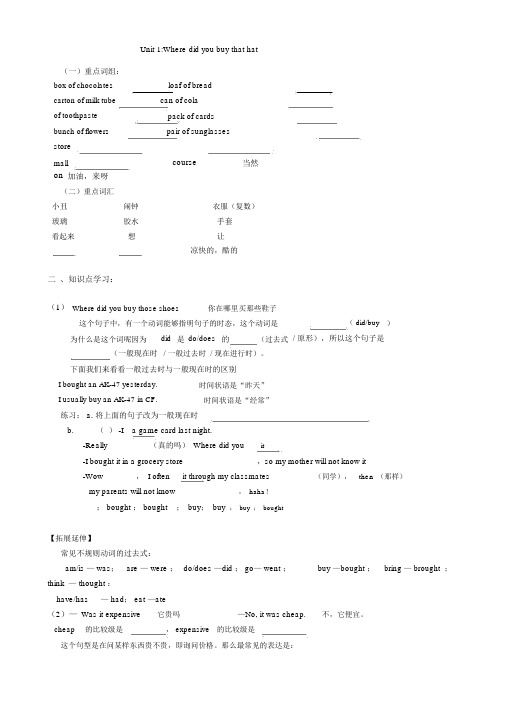
Unit 1:Where did you buy that hat (一)重点词组:box of chocolates carton of milk tube of toothpaste bunch of flowersloaf of breadcan of colapack of cards pair of sunglassesstoremall course 当然on 加油,来呀(二)重点词汇小丑玻璃看起来闹钟胶水想衣服(复数)手套让凉快的,酷的二、知识点学习:(1)Where did you buy those shoes 你在哪里买那些鞋子这个句子中,有一个动词能够指明句子的时态,这个动词是( did/buy )为什么是这个词呢因为did 是do/does 的(过去式/ 原形),所以这个句子是(一般现在时/ 一般过去时 / 现在进行时)。
下面我们来看看一般过去时与一般现在时的区别I bought an AK-47 yesterday. 时间状语是“昨天”I usually buy an AK-47 in CF. 时间状语是“经常”练习: a. 将上面的句子改为一般现在时b.() -I a game card last night.-Really(真的吗)Where did you it-I bought it in a grocery store,so my mother will not know it-Wow,I often it through my classmates(同学),then(那样)my parents will not know,haha!; bought ; bought;buy;buy;buy;bought【拓展延伸】常见不规则动词的过去式:am/is — was;are — were ;do/does —did ; go— went ;buy —bought ;bring — brought ;think — thought :have/has— had; eat —ate(2)—Was it expensive 它贵吗—No, it was cheap. 不,它便宜。
(完整版)广东版开心英语六年级下册unit1知识点.doc
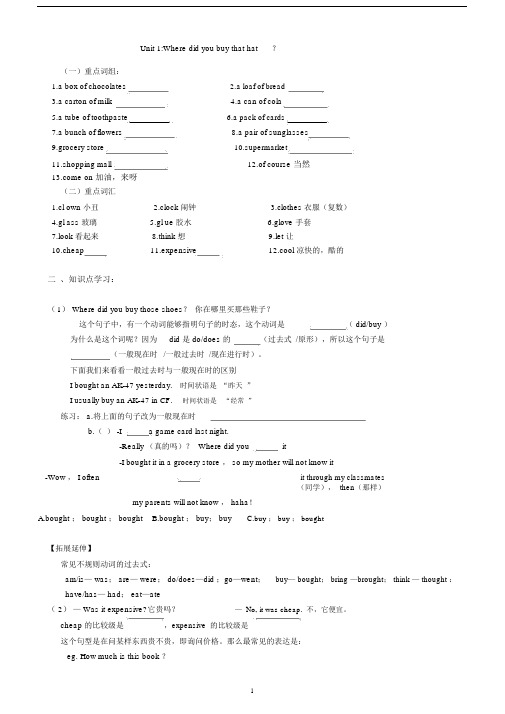
Unit 1:Where did you buy that hat?(一)重点词组:1.a box of chocolates2.a loaf of bread3.a carton of milk4.a can of cola5.a tube of toothpaste6.a pack of cards7.a bunch of flowers8.a pair of sunglasses9.grocery store10.supermarket11.shopping mall12.of course 当然e on 加油,来呀(二)重点词汇1.cl own 小丑2.clock 闹钟3.clothes 衣服(复数)4.gl ass 玻璃5.gl ue 胶水6.glove 手套7.look 看起来8.think 想9.let 让10.cheap11.expensive12.cool 凉快的,酷的二、知识点学习:(1) Where did you buy those shoes?你在哪里买那些鞋子?这个句子中,有一个动词能够指明句子的时态,这个动词是( did/buy )为什么是这个词呢?因为did 是 do/does 的(过去式/原形),所以这个句子是(一般现在时/一般过去时 /现在进行时)。
下面我们来看看一般过去时与一般现在时的区别I bought an AK-47 yesterday.时间状语是“昨天”I usually buy an AK-47 in CF.时间状语是“经常”练习: a.将上面的句子改为一般现在时b.() -I a game card last night.-Really (真的吗)?Where did you it-I bought it in a grocery store , so my mother will not know it-Wow , I often it through my classmates(同学), then(那样)my parents will not know , haha!A.bought ; bought ; boughtB.bought ; buy; buyC.buy ; buy ; bought【拓展延伸】常见不规则动词的过去式:am/is— was; are— were; do/does—did ;go—went;buy— bought; bring —brought; think — thought :have/has— had; eat—ate( 2)— Was it expensive?它贵吗?—No, it was cheap.不,它便宜。
开心英语六年级下知识点

开心英语六年级下知识点一、动词时态1. 一般现在时:动作经常发生或真理2. 一般过去时:过去某个时间的动作或经常的动作3. 一般将来时:将来要发生的动作或计划中的动作4. 现在进行时:现在正在进行的动作5. 过去进行时:过去某个时间正在进行的动作6. 现在完成时:已经发生或完成的动作对现在有影响7. 过去完成时:过去某个时间之前发生或完成的动作二、名词复数形式1. 一般加“s”:单数名词加“s”2. 以“s”、“sh”、“ch”、“x”、“o”结尾的加“es”:多数名词加“es”3. 以“辅音字母+y”结尾的变“y”为“i”,加“es”:如:baby-babies4. 不规则名词:如:child-children,man-men等三、形容词比较级和最高级1. 比较级:比较两个人或事物时的程度2. 最高级:多个人或事物中程度最高的3. 一般比较级和最高级:如:big-bigger-biggest4. 以“辅音字母+y”结尾的变“y”为“i”加“er”或“est”:如:happy-happier四、副词比较级和最高级1. 比较级:比较两个动作的程度2. 最高级:多个动作中程度最高的3. 副词比较级和最高级:如:fast-faster-fastest4. 以“辅音字母+y”结尾的变“y”为“i”加“er”或“est”:如:early-earlier五、连词使用1. 并列连词:连接并列的两个词、词组或句子2. 从属连词:连接主句和从句3. 连接副词:连接两个句子或词组1. 方位介词:表示方向、位置、时间等2. 时间介词:表示什么时间、持续多久等3. 方式介词:表示通过什么方式或方法实现4. 介词短语:介词和它后面的宾语(名词或代词)构成,作为句子中的一部分七、冠词使用1. 定冠词:“the”用于特指的人或物2. 不定冠词:“a”用于泛指的人或物3. 零冠词:句子中没有冠词的情况1. 人称代词:代替特定人或物2. 物主代词:表示所属关系3. 指示代词:指示特定的人或物4. 不定代词:泛指或表示数量的代词九、数字和日期1. 基数词:表示数量的数字2. 序数词:表示顺序或位置的数字3. 日期的表达:年、月、日的表示方法十、交际用语1. 问候语:表示问候或打招呼的用语2. 道别语:表示告别或道别的用语3. 感谢与回答:表示感谢或回答的用语4. 道歉与回答:表示道歉或回答的用语以上是开心英语六年级下知识点的简要介绍,希望对你的学习有所帮助。
最新版开心英语六年级下总复习

最新版开心英语六年级下总复习Unit 1A Parade DayIn this unit。
we will learn the past tense in English through the stories that happened around Gogo.Important reminder: The letter n "cl" in words is pronounced as /kl/.Examples:clean - to washclose - to shutclever - intelligentclass - a group of studentscloudy - partly or completely covered in cloudsclothes - garments worn on the bodyVerbs:use - to utilizestudy - to learnplay - to engage in an activity for enjoymentvisit - to go and see someonerun - to move quickly on foottalk - to communicate verballyjump - to propel oneself upwardsPhrases:clean up - to tidy uplast night - the us eveningthe day before yesterday - two days agon:1.What did you do yesterday。
- I played basketball.2.What did you do the day before yesterday。
- I also played basketball then.Musical Instruments:trumpet - a brass instrumentdrum - a n instrumentn:StoryLook。
开心版英语六年级知识点
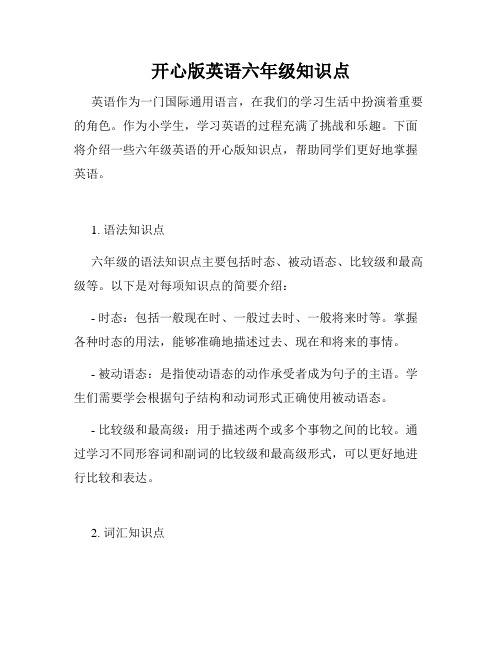
开心版英语六年级知识点英语作为一门国际通用语言,在我们的学习生活中扮演着重要的角色。
作为小学生,学习英语的过程充满了挑战和乐趣。
下面将介绍一些六年级英语的开心版知识点,帮助同学们更好地掌握英语。
1. 语法知识点六年级的语法知识点主要包括时态、被动语态、比较级和最高级等。
以下是对每项知识点的简要介绍:- 时态:包括一般现在时、一般过去时、一般将来时等。
掌握各种时态的用法,能够准确地描述过去、现在和将来的事情。
- 被动语态:是指使动语态的动作承受者成为句子的主语。
学生们需要学会根据句子结构和动词形式正确使用被动语态。
- 比较级和最高级:用于描述两个或多个事物之间的比较。
通过学习不同形容词和副词的比较级和最高级形式,可以更好地进行比较和表达。
2. 词汇知识点在六年级学习英语时,要注重积累词汇量,扩大词汇量对提高阅读和听力能力非常重要。
以下是一些常见的词汇知识点:- 动词:学习不同动词的基本形式、过去式和过去分词形式,以及它们在句子中的用法。
- 名词:熟悉不同名词的单数和复数形式,学会正确使用可数名词和不可数名词。
- 形容词和副词:学习形容词和副词的比较级和最高级形式,掌握它们在句子中的用法。
- 介词:了解一些常见的介词,学会在句子中正确使用它们。
3. 句型知识点在学习英语的过程中,掌握一些常用的句型能够帮助我们更好地表达自己。
以下是一些常见的句型知识点:- 祈使句:用于表达命令、请求或建议。
学生们需要学会在适当的场合中使用祈使句。
- 疑问句:用于提问。
学生们需要学会使用不同的疑问词构造合适的疑问句。
- 肯定句和否定句:学生们需要学会将陈述句转化为肯定句或否定句,以便更好地表达自己的意思。
4. 阅读技巧阅读是学习英语的重要环节之一。
以下是一些提高阅读理解能力的技巧:- 预测:在阅读文章之前,预测一下文章的大意和主题,从而更好地理解文章。
- 上下文推测:通过上下文推测生词的意思,避免频繁使用词典,提高阅读效率。
广东开心英语六年级知识点
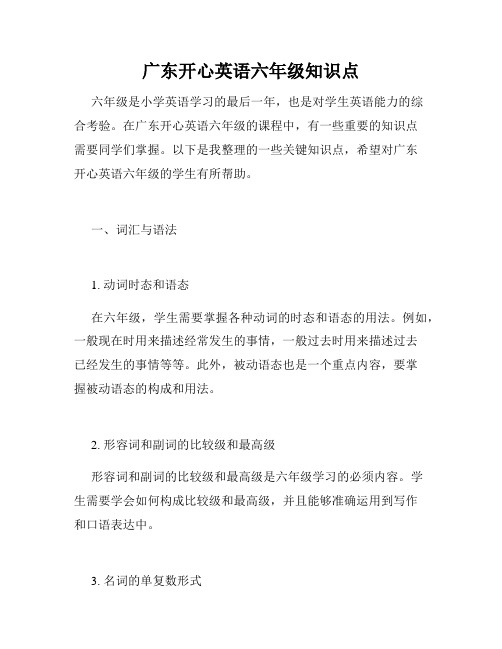
广东开心英语六年级知识点六年级是小学英语学习的最后一年,也是对学生英语能力的综合考验。
在广东开心英语六年级的课程中,有一些重要的知识点需要同学们掌握。
以下是我整理的一些关键知识点,希望对广东开心英语六年级的学生有所帮助。
一、词汇与语法1. 动词时态和语态在六年级,学生需要掌握各种动词的时态和语态的用法。
例如,一般现在时用来描述经常发生的事情,一般过去时用来描述过去已经发生的事情等等。
此外,被动语态也是一个重点内容,要掌握被动语态的构成和用法。
2. 形容词和副词的比较级和最高级形容词和副词的比较级和最高级是六年级学习的必须内容。
学生需要学会如何构成比较级和最高级,并且能够准确运用到写作和口语表达中。
3. 名词的单复数形式名词的单数和复数形式也是六年级需要掌握的基础知识点。
学生需要学会不规则名词的变化规则,并能正确运用到句子中。
二、阅读理解1. 阅读短文并回答问题在阅读理解部分,学生需要通过阅读短文,理解短文的内容,并根据问题作出正确回答。
同时,还要注意细节的把握,例如找出关键词,通过上下文推测词义等。
2. 根据短文填空除了回答问题外,学生还需要通过阅读短文,在给定的空格中填入适当的词语,使短文通顺且语义完整。
三、口语表达1. 自我介绍学生需要能够自如地进行自我介绍,并能够包括自己的姓名、年龄、爱好等基本信息。
2. 表达喜好和意愿六年级学生还需要学会表达自己的喜好和意愿,并能够使用相应的句式和词汇进行表达。
例如,我喜欢游泳,我想成为一名老师等等。
四、写作能力1. 句子和段落的连贯学生需要学会构造连贯的句子,在写作中要注意句子之间的衔接和过渡。
同时,还要注意段落之间的衔接,使整篇文章结构合理。
2. 描述人物、事物或场景写作中,学生需要练习描述人物、事物或场景。
通过适当使用形容词和副词等,能够使文章更加生动、形象。
以上提到的知识点只是广东开心英语六年级的一部分,通过学习这些知识点,学生能够在英语学习中有一个坚实的基础。
(完整版)开心学英语六年级下册Unit1复习

学科: 英语任课教师:授课时间:2013年1月日(星期),14:00-16:00姓名年级:小六教学课题六年级下Unit1词汇及语法阶段基础()提高(√)强化()课时计划第(1 )次课,共()次课教学目标知识点:词组意思,动词短语基本用法综合能力:熟记基本词汇,正确翻译课本语句,模仿例句教学方法教法:启发式教学、讲练结合法辅助教具:白板,PPT课前检查作业完成情况:优□良□中□差□建议__________________________________________一、温习巩固Unit 1:Where did you buy that hat?(一)重点词组:1.a box of chocolates2.a loaf of bread3.a carton of milk4.a can of cola5.a tube of toothpaste6.a pack of cards7.a bunch of flowers 8.a pair of sunglasses9.grocery store 10.supermarket11.shopping mall 12.of course当然e on加油,来呀(二)重点词汇1.cl own小丑2.cl ock闹钟3.cl othes衣服(复数)4.gl ass玻璃5.gl ue胶水6.gl ove手套7.look看起来 8.think想 9.let让10.cheap 11.expensive 12.cool凉快的,酷的二、知识点学习:(1) Where did you buy those shoes?你在哪里买那些鞋子?这个句子中,有一个动词能够指明句子的时态,这个动词是(did/buy)为什么是这个词呢?因为did是do/does的(过去式/原形),所以这个句子是(一般现在时/一般过去时/现在进行时)。
下面我们来看看一般过去时与一般现在时的区别I bought an AK-47 yesterday. 时间状语是“昨天”I usually buy an AK-47 in CF. 时间状语是“经常”练习:a.将上面的句子改为一般现在时b.()-I a game card last night.-Really(真的吗)?Where did you it-I bought it in a grocery store,so my mother will not know it-Wow,I often it through my classmates(同学),then(那样) my parents will not know,haha!A.bought;bought;boughtB.bought;buy;buyC.buy;buy;bought【拓展延伸】常见不规则动词的过去式:am/is—was; are—were; do/does—did;go—went;buy—bought; bring—brought; think—thought:have/has—had; eat—ate(2)— Was it expensive?它贵吗?—No, it was cheap.不,它便宜。
开心学英语小学六年级毕业复习语法与句型

小学六年级英语毕业复习资料(一)时态一、一般现在时: 表示经常性、规律性习惯性(de)动作或现在存在(de)状态. 结构:1. 动作词一般用原形,但如果是第三人称单数时(如Tony ,he ,she ),动作词用第三人称单数形式,即加s 或 es ;在主语前加do, does帮助疑问句,后面(de)动词用原形;在动作词前加don’t, doesn’t 帮助否定句,后面(de)动词用原形.2. 句子中没动作词时,用be动词:is , am , are ;is , am , are 放在主语前帮助疑问句;is , am , are 后面加上not帮助否定句.3. 情态动词can, may, should,must引起(de)句子是一般现在时,后面接动词用原形;can, may, should,must 放在主语前帮助疑问句,后面接动词用原形;can, may, should, must后面加上not帮助否定句,后面接动词用原形.4. 肯定祈使:动词原形 + 其它否定祈使句:Don’t +动词原形 + 其它5.感叹句: What a mess What a beautiful desert What beautiful flowers ——What+(形)名How beautiful How beautiful the flower is How beautiful the flowers are —— How+形A. :(非第三人称单数)主语+V+其它We come from China.(第三人称单数)主语+Vs+其它He comes from China.主语+be (is, am, are)+其它We are from China.主语+情态动词(can, may, should, must)+V+其它She must go.B. :(非第三人称单数)主语+don’t +V+其它We don’t come from China.(第三人称单数) 主语+doesn’t +V+其它He doesn’t come from China.主语+be (is, am, are) not+其它I aren’t from China.主语+情态动词(can, may, should, must)+not +V+其它C.一般:Do +(非第三人称单数)主语+V+其它 Do you come from ChinaDoes +(第三人称单数)主语+Vs+其它 Does he come from Chinabe (Is, Am, Are)+主语+其它 Are you from China情态动词(Can, May, Should, Must)+主语+ V+其它She can’t go.D.特殊疑问句:+do +(非第三人称单数)主语+V+其它 Where do you come from+does +(第三人称单数)主语+Vs+其它 Where does he come from+be (is, am, are)+主语+其它 Where are you from+情态动词(Can, May, Should, Must)+主语+ V+其它 Can she go二、现在进行时:表示现在正在进行(de)动作.结构:1. be动词( is , am , are) + 动词ing (现在分词);is , am , are 放在主语前帮助疑问句,后面(de)动词加ing;is , am , are 后面加上not帮助否定句,后面(de)动词加ing.A. :主语+be(is, am, are)+Ving+其它 They are coming here.B. 否定句:主语+be(is, am, are)+not +Ving+其它They aren’t coming here.C. 一般疑问句:be(Is, Am, Are)+主语+ Ving+其它 Are they coming hereD. :特殊疑问词+ be(is, am, are)+主语+ Ving+其它 What are they doing三、一般过去时:表示过去某个时间里发生了(de)动作或状态. 结构:1. 动作词用过去式(ed ) ;在主语前加did帮助疑问句,后面(de)动词用原形;在动作词前加didn’t帮助否定句,后面(de)动词用原形.2. 句子中没动作词时,用be动词(de)过去式:was , were;was , were 放在主语前帮助疑问句;was , were后面加上not帮助否定句.A. :主语+Ved+其它We came from China主语+be (was, were)+其它 We were from China.B. :主语+didn’t +V +其它 We didn’t come from China.主语+be (was, were) +not+其它 We weren’t from China.C.一般:Did +主语+V +其它 Did you come from China be (Was, Were)+主语+其它 Were you from ChinaD.特殊疑问句:特殊疑问词+ did +主语+V +其它 Where did you from特殊疑问词+ be (was, were)+主语+其它 Where were from四、一般将来时:表示将来某个时间(de)动作或状态.结构:1. be going to + 动词原形is , am , are 放在主语前帮助疑问句;is , am , are 后面加上not帮助否定句.2. will+ 动词原形will放在主语前帮助疑问句,后面接动词用原形;will后面加上not帮助否定句,后面接动词用原形.A. :主语+will +V +其它 He will dig a hole.主语+ be going to +V +其它 He is going to dig a hole.B. :主语+will not +V +其它 He won’t dig a hole.主语+ be not going go +V +其它 He isn’t going to dig a hole.C.一般:Will+主语+V+其它 Will he dig a holeBe(Is, Am, Are) +主语going to +V+其它 Is he going to did a holeD.特殊疑问句:特殊疑问词+will+主语+V+其它 What will he do特殊疑问词+be(is, am, are) +主语going to +V+其它What is he going to do五、过去进行时:表示过去某时正在进行(de)动作.结构:1. be动词( was, were) + 动词ing;was, were 放在主语前帮助疑问句,后面(de)动词加ing;was, were后面加上not帮助否定句,后面(de)动词加ing.A. :主语+be(was, were)+Ving He was digging a hole.B. 否定句:主语+be(was, were)+not +Ving He wasn’t digging a hole.C. 一般疑问句:be(Was, Were)+主语+ Ving Was he digging a holeD. :特殊疑问词+ be(was, were)+主语+ Ving What was he doing(二)时态意义与结构一览表:(三)句子(de)分类1. 陈述句A.肯定陈述句:①主语+be+其它+句号②主语+V(Vs, Ved)+其它+句号③主语+情态动词+V+其它+句号B.否定陈述句:①主语+be not +其它+句号②主语+don’t(doesn’t, didn’t)+V+其它+句号③主语+情态动词+not+V+其它+句号2. 疑问句A.一般疑问句:①be+主语+其它+问号②Do(Does,Did)+主语+V+其它+问号③情态动词+主语+V+其它+问号B.特殊疑问句:①特殊疑问词+be+主语+其它+问号②特殊疑问词+do(does,did)+主语+V+其它+问号③特殊疑问词+情态动词+主语+V+其它+问号3.祈使句A.肯定祈使句:动词(原形)+其他+标点B.否定祈使句:Don’t+动词(原形)+其他+标点4.感叹句: What a mess What a beautiful desert What beautiful flowers —What+(形)名How beautiful How beautiful the flower is How beautiful the flowers are —How+形(五)描写天气(de)句型A. There be+名词, There will be+名词.(名词:snow, wind, rain, cloud, sun)如:There is rain. There was rain. There will be rain. B. It be+形容词,It will be+形容词.(形容词:snowy, windy, rainy, cloudy, sunny, hot,, cold, warm, cool, fine)如:It is rainy. It was rainy. It will be rainy. C. It +Vs 或Ved, It+be +Ving It+ will +V.(名词:snow, wind, rain)如:It rains. It rained. It is raining. It will rain.(六)形容词比较级和最高级一.形容词比较级:1. 指两个人或物相对比. 2. 标志词:than3. much 用来修饰形容词比较级,放在比较级前面.4. 事物之间(de)比较用What, Which; 人物之间比较用Who如: He is taller than me. He is much taller than me. She is much more beautiful than me.二.形容词最高级:1. 指三个或三个以上(de)人或物作对比 2. 标志词:in,of3. 最高级前面一般加定冠词the如:He is the tallest of the three. He is the tallest in our class.(七)缩写与分写1. (not缩写成---n’t或---’t )isn’t =is not aren’t=are not don’t=do not doesn’t=does not didn’t=did notwasn’t=was not weren’t=were not mustn’t=must not shouldn’t=should not can’t=can not2. (is缩写成---’s)he’s=he is she’s=she is it’s=it is name’s=name is that’s=that iswhat’s=what is who’s=who is where’s=where is how’s=how is Tony’s=Tony is3. (are缩写成---’re)they’re=they are we’re=we are you’re=you are there’re=there arewho’re=who are what’re=what are where’re=where are4 . 其它I’m =I am Let’s =Let us won’t=will not注:月份与星期缩写形式用单词前面三个字母. 如:Sunday=Sun. January=Jan.am not 不能写成amn’t this is 不能写成 this’s(七)一些特殊词或词组(de)用法一.冠词a, an, the (de)用法.1. 不定冠词 a 、an :用于单数可数名词之前,表示未被特指(de)或第一次被提到(de)人或物;a用于辅音音素前,an用于元音音素前.__book __desk __apple __orange __uncle __unicorn __umbrella __eraser __idea __hour __house __red __apple __elk__old book __good idea __island __airplane __English teacher 2. 定冠词 the :用于所有名词前,表示特指(de)或前面提到(de)人或物,也可以表示世上独一无二事物.(注:形容词最高级前用the)___moon ___earth ___sun ___Great Wall3. 名词前用a、 an、 the,但名字前不能用a、 an、 the.练习:用a、 an、 the填空.1.That’s ____ island. ______ island is big.2.I have ____ new book. Jenny has____ old book.3.Yesterday I studied English____ hour.4.This is ____ bag. _____ bag is Tom’s.5._____ man is Lisa’s father.6.Tom wants to be ___ scientist. He wants to go to ____ moon.7.Jenny has ___ uncle and ____ cousin.8.I have ____ eraser. _____ eraser is in my bag.9.____ boy is Tom’s brother. He is ____ good student.10.There is ____ English book on ____ desk. ____ English book is Tom’s.11.I have ___ book, It is ___ English book. And it has ___good story.___ book is in my bag.12.There is ____ cat under the tree. ____ cat is playing.13.This is ___ orange. That’s ___ big orange.14.____ Lisa went to visit ____ Great Wall in China.二.be动词(de)用法1. be动词(de)现在式有:is, am,are2. be动词(de)过去式有:was, wereA. is 用于所有(de)单数,I、you除外. A.was是is,am(de)过去式B.are用于所有复数和you. B.were是are(de)过去式C.am与I连用.三.助动词do, does, did(de)用法:A. 在疑问句、否定句中帮助动词,被帮助(de)动词要用原形.B. do用于非第三人称单数(de)一般现在时,后面(de)动词用原形.C. does用于第三人称单数(de)一般现在时,后面(de)动词用原形.D. did用于所有一般过去时,后面(de)动词用原形.四.many(许多,大量), much(许多,大量),a lot of(许多,大量), lots of(许多,大量),plenty of(许多,大量)(de)用法:A.many修饰可数名词复数,much修饰不可数名词.B.a lot of=lots of=plenty of, 修饰可数名词复数或不可数名词.五.how many(多少), how much(多少)(de)用法:A.how many修饰可数名词复数,how much修饰不可数名词.B.how much可以用来问价钱.六.some(一些), any(一些,任何)(de)用法:A.修饰可数或不可数名词.B.some用于肯定句中,any用于否定句或疑问句中.C.当疑问句是表示建议、请求、请客或希望得到肯定答复时,用some.如:Can I have some balloons 我可以要一些气球吗(请求)Would you like some coffee 你想要一些咖啡吗(请客)七.have, has, there is, there are (de)用法:A.have, has表示某人或某物拥有,have用于非第三人称单数 has用于第三人称单数.I have two books. A dog has four legs.B.there is, there are 表示某个地方存在有.C.there be 结构be动词(de)选择要根据句子(de)第一个名词确定,即就近原则.如:There are two books and a pen on the table.There is a pen and two books on the desk.八.like(喜欢), love(爱), be like(像…一样)(de)用法:A.like+Ving=like to+V, love+Ving=love to+V 如:I like swimming.=I like to swim. I love camping.=I love to camp.B.What be ….like …怎么样如:What’s the weather like It’s sunny.What are your shoes like They are dirty.但: What do you like I like apples.九.Worry(担心), worried(担心(de)) (de)用法: Don’t worry.=Don’t be worried.十一.be动词is, am, are, was, were与助动词do, does, did (de)用法:A. 句子中没动词(de)时候,用be动词.B. 在有行为动词(de)疑问句或否定句中,用助动词,后面(de)动词用原形.如:_______ you at home yesterday ______ you go home yesterday 十二.put on(穿)与wear(穿着)(de)用法:put on 强调穿衣(de)动作,wear 强调状态.如:Please ________ the coat. She is __________ a yellow today.十三.look for(寻找)与find(找到)(de)用法:look for强调找(de)过程,find强调找(de)结果.十四.后面加动词原形(de)词:1.态动词can. may. will. must. Should2..助动词do. does. did3.其它let. to. help十五.时间介词in, on , at(de)用法:1.具体到某年、某季节、某月,用 in;2.具体到某天,用 on;3.具体到几点,用 at.(七)重点句型一.介绍人物(What, Who)、问候(How)、礼貌用语.1. What’s your name -------I’m Tony. My name’s Tony.你(de)名字是什么我是托尼.2. Who’s she She’my mother.她是谁她是我(de)妈妈.Who’s that boy He’s my friend. His name’s Ben. Look,that’s my teacher.那个男孩是谁他是我(de)朋友. 他(de)名字是本. 看,那是我(de)老师.How about me You’re my friend.那么我呢你是我(de)朋友.3. 第一次见面问候: Nice to meet you. Nice to meet you, too.很高兴认识你. 也很高兴认识你.How do you do How do you do你好吗你好吗4. 老朋友见面问候: How are you I’m fine, thank you.你好吗我很好,谢谢.And you I’m fine, too.你呢我也很好.5. 问候对方家人: How is your mother She’s fine, thanks.你妈妈好吗她很好,谢谢.6. 道谢: Thank you. / Thanks. /Thank you very much./ Thanks a lot.谢谢. 谢谢. 很感谢. 很感谢.----- You’re welcome. That’s (It’s) OK. That’s (It’s) all right. Not at all.别客气. 没关系. 没关系. 没关系.7. 道歉: Sorry. ----- It doesn’t matter. That’s (It’s) OK. That’s (It’s) all right. Not at all.不要紧. 没关系. 没关系. 没关系.二.介绍某物:1.What’s this (that) It’s a desk.这(那)是什么它是一张书桌.2. What are these(those) They’re apples.这些(那些)是什么它们是苹果.3.Is this (that) a panda Yes, it is. No, it isn’t.这是一只熊猫吗是,它是. 不,它不是.4.Are these(those) grapes Yes, they are. No, they aren’t.这些是葡萄吗是(de),它们是.不,它们不是.5.This(That) is an ant. This(That) isn’t an ant.这(那)是一只蚂蚁. 这(那)不是一只蚂蚁.6.These(Those) are ants. These(Those) aren’t ants.这些(那些)是蚂蚁. 这些(那些)不是蚂蚁.三.建议(Let)、命令、请求 (Can, May)、能力(can).1.建议: Let’s go swimming. OK. / All right. / That’s a good idea.让我们去游泳吧. 好(de). 好(de). 好主意.2. 命令: Touch your nose Don’t close your eyes触摸你(de)鼻子别闭上你(de)眼睛3. 请求: Let me have a look. OK.Can(May) I have a peach Sure. Here you are. \ No. Sorry.我可以要一个桃子吗当然.给你. 不,对不起.Can you take out the trash,please Sure . I’ll take it out .Sorry . I’m busy now .你可以拿走垃圾吗当然可以.我会拿走它(de).对不起.我现在很忙.Can you hang up my clothes , please Sure . I’ll hangthem up in a minute .你可以挂起我(de)衣服吗当然可以.一会儿我会挂起它们4. 能力:Can you sing Yes, I can. No, I can’t.你会唱歌吗是(de),我会. 不,我不会.Can he sing No, he can’t sing. But he can dance.他会唱歌吗不,他不会唱歌. 但他会跳舞.What can Gogo do He can fly. He flies to the park every week.高高能做怎么他能飞. 他每个星期五都飞去公园.四.喜欢某物(what, like),喜欢做某事(what, like doing).1.喜欢某物(what, like):What do you like I like milk.你喜欢什么我喜欢牛奶.Does Jenny like milk Yes, she does. She likes milk.珍妮喜欢牛奶吗是(de),她喜欢.她喜欢牛奶.Do they like mike No, they don’t. They don’t like milk.他们喜欢牛奶吗是(de),他们不喜欢.他们不喜欢牛奶.2. 喜欢做某事(what, like doing):What do you like doing I like reading comic books.你喜欢做什么我喜欢看漫画书.Does Jenny like reading comic books Yes, she likes reading comic books.珍妮喜欢看漫画书吗是(de),她喜欢.她喜欢看漫画书.Do they like reading comic books No, they don’t like reading comic books.他们喜欢看漫画书吗不,他们不喜欢看漫画书.五.想要某物(what, want),想做做某事(what, want to do).1.喜欢某物(what, want):What do you want I want a guitar.你想要什么我想要一个吉他.Does Jenny want a guitar Yes, she does. She wants a guitar.珍妮想要一个吉他吗是(de),她想要.她想要一个吉他.Do they want a guitar No, they don’t. They don’t want a guitar.他们想要一个吉他吗不,他们不想要.他们不想要一个吉他.2. 喜欢做某事(what, want to do):What do you want to do I want to see a movie.你想做什么我想看电影.Does Jenny want to see a movie Yes, she does. She wants to see a movie.珍妮想看电影吗是(de), 她想.她想电影吗.Do they want to see a movie No, they don’t. They don’t want to see a movie.他们想看电影吗不,他们不想.他们不想看电影.五.天气(某物)怎么样.(what , be like)What was the weather like yesterday It was sunny.昨天(de)天气怎么样是晴朗(de).What will the weather be like tomorrow It will be sunny.明天(de)天气将会怎样将会是晴朗(de).What are your shoes like today They are dirty.你(de)鞋子今天怎么样是脏(de).What were your shoes like yesterday They were clean.你(de)鞋子昨天天怎么样是干净(de).五.问时间.1. 星期(What day): What day is it today It’s Sunday.今天是星期几是星期天.What day was it yesterday It was Saturday.昨天是星期几是星期六.2.日期(What’s the date) : What’s the date today I t’s July 13th .今天是什么日期是七月13日.What was the date yesterday It was July 12th .昨天是什么日期是七月12日.3. 几点(What time) : What time is it now It’s ten o’clock.现在几点了十点.What time did you go to school this morning I went to school at 7:00.你今天早上几点上学我七点上学.4. 什么时候(When) : When’s winter holiday It’s in January and February.寒假是在什么时候在一月和二月.When’s your birthday It’s in June. It’s on June 1st .你(de)生日在什么时候在六月. 在六月1日.六.问职业.(What)What do you do I’m a doctor. I work in the hospital.你是做什么(de) 我是医生. 我在医院工作.What does he do He’s a teacher. She works in the school.他是做什么(de) 他是教师. 他在学校工作.What do you want to be I want to be an office worker.你想成为什么我想成为一名办公室工作人员.What dose she want to be She wants to be a nurse.她想成为什么她想成为一名护士.五.谁(de)东西,形容词性无主代词与名词性无主代词.(whose, my/mine)1. ------Whose skateboard is this 或 Whose is this skateboard这是谁(de)滑板这滑板是谁(de)----- It’s my skateboard. 或 It’s mine.是我(de)滑板. 是我(de).2. ------ Is this your money 或Is this money yours这是你(de)钱吗这钱是你(de)吗------ Yes, it’s my money. 或 Yes, it’s mine. (Yes, it is.) 是(de),是我(de)钱. 是(de),是我(de). 是(de),它是.3. ------Are these Jenny’s keys 或 Are these keys Jenny’s这些是珍妮(de)钥匙吗这些钥匙是珍妮(de)吗------ No, they’re not her keys. 或No, they’re not hers. (No, they aren’t.)不,它们不是她(de)钥匙. 不, 它们不是她(de). 不,它们不是.六.问颜色.(What color)What color is this It’s orange.这是什么颜色它是橙色.What color are these leaves They are red, yellow and orange.这些叶子是什么颜色(de) 它们是红色、黄色和橙色(de).六.问年龄(How old).How old are you I’m ten. How old is your brother He’s seven years old.你几岁我是十岁. 你(de)(de)弟弟几岁他七岁. 六.问数量(How many可数, How much不可数);问价钱(How much)How many cherries are there on the table There are twelve cherries.桌子上有多少个樱桃有十二个.How much water is there in the glass There is a lot of water.玻璃杯里有多少水有许多水.How much is the guitar It’s 85 dollars.这吉他多少钱它是85美元.How much are those socks They four yuan.这些袜子多少钱他们是4元六.问发生什么事情(What).What happened A typhoon came.What happened to the trees The wind blew away their leaves.What’s the matter with her She has a fever. She should take some medicine.What’s wrong with him He caught a cold. He should stay in bed.六.问怎样去某地(How).1. How do you go to school I go to school on foot./ I walk to school.2. How does Jenny go to school She goes to school by subway.He takes the subway to school. She goes to school on the subway.六.问多久做某事几次(How often).How often do you go fishing I go fishing about once a week .你多长时间钓一次鱼我大约每星期钓一次鱼.How often does he eat fish He eats fish about once a year .你多长时间吃一次鱼我大约每年吃一次鱼.六.问方位(Where).Where’s my wallet It’s behind the sofa.我(de)钱包在哪里它在沙发(de)后面.Where are my glasses They’re in front of the bookcase.我(de)眼镜在哪里它们在书架(de)前面.Where did you buy those shoes I bought them at the shopping mall .你在哪里买(de)这些鞋子我在购物商场买(de).Where do you come from I come from Xinhui.Where are you from I’m from Xinhui.Where did you come from I came from Shanghai.Where were you from I was from Shanghai.Book1 ---Book8 TargetBook1Unit 1 What’s your name I’m Tony.你(de)名字是什么我是托尼.I’m Jenny. What’s your name I’m Gogo.我是珍妮. 你(de)名字是什么我是高高.Unit2 What’s this It’s a desk. And this Oh, it’s an eraser.这是什么它是一张书桌. 这个呢哦,它是一块橡皮.Unit3 Can you read Yes, I can. What about you No, I can’t. But I can fly.你会读吗是,我会. 那么你呢不,我不会. 但我会飞.Unit5 Who’s she She’s my mother. Who’s he He’s my friend.她是谁她是我(de)妈妈. 他是谁他是我(de)朋友.Unit6 Who’s that boy He’s my friend. His name’s Ben. Look, that’s my teacher.那个男孩是谁他是我(de)朋友. 他(de)名字是本. 看,那是我(de)老师.What’s her name Her name’s Ms. Black.她(de)名字是什么她(de)名字是布来克先生.Unit7 Is this a panda No, it isn’t. Is this a polar bear Yes, it is.这是一只熊猫吗不,它不是. 这是一只北极熊吗是,它是.Unit 9 What color is this It’s orange. Look, it’s an apple. It’s red. Yes, it is.这是什么颜色它是橙色. 看,它是一个苹果.它是红色.是,它是.Unit10 How old are you I’m ten. This is my brother. How old is he He’s seven.你几岁我是十岁. 这是我(de)弟弟. 他几岁他七岁.Unit11 What do you like ,Tony I like cheese. What do you like, Jenny I like cake.你喜欢什么,托尼我喜欢奶酪. 你喜欢什么,珍妮我喜欢蛋糕.Book 2Unit1 What’s this It’s a butterfly. I like chicken. What do you like I like steak.这是什么这是一只蝴蝶. 我喜欢鸡肉. 你喜欢什么我喜欢牛排.Unit 3 Do you like tennis No, I don’t. I like baseball.你喜欢网球吗不,我不喜欢. 我喜欢棒球.Do you like soccer, Tony Yes, I do.托尼,你喜欢足球吗是(de),我喜欢.Unit 5 What’s that It’s a pink lamp.那是什么那时一盏粉红色(de)灯.Is that a pink pillow No, it isn’t. It’s a white pillow.那是一个粉红色(de)枕头吗不,它不是. 它是一个白色(de)枕头.Is that a brown door Yes, it is.那是一扇棕色(de)门吗是,是(de).Unit 6 What are these They are pears.这些是什么它们是梨.Oh, are these peaches No, they aren’t. They are oranges.哦,这些是桃子吗不, 它们不是. 它们是桔子.Are these grapes Yes, they are.这些是葡萄吗是(de),它们是.Unit 7 Where is my skirt It’s under the bed . Oh ,no 我(de)短裙在哪里它在床上. 哦,不Where are my socks They are under the pillow.我(de)袜子在哪里它们在枕头下面.Unit 9 What time is it It’s eleven o’clock. Is it twelve o’clock Yes , it is .什么时间了它是十一点钟. 十二点钟了吗是,是(de).Unit 10 How many cherries are there There are twelve . Look there are thirteen strawberries.有多少樱桃有二十个. 看有十三个草莓.Unit 11 Does she have napkins No, she doesn’t. She has glasses.她有餐巾吗不,她没有. 她有玻璃杯.Do you have forks Yes, we do .你们有叉吗是(de),我们有.Book 3Unit 1 Are you hungry Yes, I am .你是饥饿(de)吗是(de),我是.Who’s she She’s my grandmother.她是谁她是我(de)奶奶.What’s that It’s a stapler.那是什么它是钉书机.Unit2 What day is it today It’s Monday.今天是星期几它是星期一.What do you do on Monday I play the violin on Monday.你在星期一干什么我在星期一拉小提琴.Unit 3 Can I have a peach Sure. Here you are .我可以要一个桃子吗当然.给你.Can I have a balloon No. Sorry.我可以要一个气球吗不,对不起.Unit 5 Do you like math Yes, I do. Do you like science No, I don’t.你喜欢数学吗是,我喜欢. 你喜欢科学吗不,我不喜欢.What subjects do you like, GoGo I like art and history.高高,你喜欢什么科目我喜欢美术和历史.Unit 6 What do they want They want some glue. 他们想要什么他们想要一些胶水.Do they want a guitar No , they want a computer game.他们想要一个吉他吗不,他们想要一个电子游戏.Does she want a guitart No, she doesn’t .她想要一个吉他吗不,她不想.Do you want a guitar Yes, here you are.你想要一个吉他吗是(de) ,请给我.Unit 7Where’s my wallet It’s behind the sofa.我(de)钱包在哪里它在沙发(de)后面.Where are my glasses They’re in front of the bookcase.我(de)眼镜在哪里它们在书架(de)前.Unit 9 What’s she doing She’s writing.她在干什么她在写.What are they doing They’re drawing.他们在干什么他们在绘画.Unit 10 Touch your nose Open your mouth Close your eyes 触摸你(de)鼻子张开你(de)口闭上你(de)眼睛Unit 11 Whose skateboard is this It’s my skateboard.这是谁(de)滑板它是我(de)滑板.Whose stuffed toy is this It’s mine.这是谁(de)布制玩具它是我(de).Book 4Unit 1 These are Gogo’s shoulders. Touch Gogo’s toes.这些是高高(de)肩膀. 触摸高高(de)脚趾.What are you doing , Jenny I am moving my desk.珍妮,你在干什么我在移动我(de)书桌.Unit 2 Are you sleeping No, I’m not. I’m thinking.你正在睡觉吗不,我正在想.Is he practicing volleyball No, he isn’t. He’s practicing basketball.他正在练习排球吗不,他不是. 他正在练习篮球. Unit 3 Is she doing the dishes No, she’s not. She’s washing the clothes.她正在洗碟子吗不,她不是. 她正在洗衣服.Are they cleaning the windows Yes , they are .他们正在清洁窗户吗是,他们是.Unit 5 What are you dong I’m going to the bank. Is she going to the bank你正在干什么我正在去银行. 她正在去银行吗No, she’s going to the park. Are they going to the beach Yes, they are.不,她正在去公园. 他们正在去海滩吗是,他们是.Unit 6 What time is it It’s 7:10. It’s time to get dressed. Brush your teeth, Jenny什么时间了 7:10 . 该穿衣服了. 珍妮,刷你(de)牙What time do you go to school I go to school at 7:30.你什么时间去上学我在7:30去上学.Unit 7 What do you like I like riding my scooter.你喜欢干什么我喜欢滑我(de)滑板.Do you like reading comic books Yes, I do .你喜欢看漫画书吗是,我喜欢.Unit 9 Is this your money No, it’s not .这钱是你(de)吗不,它不是.Are these Mom’s keys I don’t know .这些是妈妈(de)钥匙吗我不知道.Is this hers Yes, it is .这是她(de)吗是,它是.Unit 10 What do you want to do I want to see a movie.你想去干什么我想去看电影.Do you want to take a walk Sure.你想去散步吗当然.Do you want to go home Not, really. I want to go to the park .你想回家吗真(de)不想. 我想去公园.Unit 11 What do you do I’m a nurse .你是干什么(de) 我是一位护士.What do you want to be I want to be a teacher .你想成为什么我想成为一位教师.Book 5Unit 1 Is this your dictionary No, it isn’t. It’s Tony’s dictionary.这是你(de)字典吗不,它不是. 它是托尼(de)字典.What does she do She’s a doctor.她是干什么(de) 她是一位医生.Unit 2 Do you have any envelopes Yes ,I do .你有一些信封吗是,我有.Do you have any stamps No , I don’t.你有一些邮票吗不,我没有.Does Jenny have any stamps Yes , she does.珍妮有一些邮票吗是,她有.Unit 3 What do you have I have some sugar.你有什么我有一些糖.Do we have any salt No, we don’t. We need some salt.我们有一些盐吗不,我们没有. 我们需要一些盐.Do we have any tofu No , we don’t . We need some tofu ,too.我们有一些豆腐吗不,我们没有. 我们也需要一些豆腐.Unit 5 What’s the weather like in spring It’s rainy in spring.在春天天气怎样在春天有雨.Is it rainy in fall No , it is n’t . I t’s windy.在秋天有雨吗不,没有. 它有风.What’s the weather like today It’s sunny and windy .今天天气怎样它是晴朗(de)和有风(de).Unit 6 When’s winter holiday It’s in January and February.寒假在什么时候它在一月和二月之间.Is January after February No , January is before February.一月在二月之后吗不,一月在二月之前.Unit 7 When’s your birthday My birthday is on October 20th .你(de)生日在什么时候我(de)生日在十月二十日.What’s the date today It’s October 20th . Today is my birthday.今天是几号十月二十日. 今天是我(de)生日. Unit 9 Your bedroom was messy this morning . Is it tidy now Yes ,it is .你(de)卧室今天早上是凌乱(de). 它现在是整洁(de)吗是,它是.My books were on the floor this morning . They are on the desk now.我(de)书今天早上在地板上. 它们现在在书桌上.Unit 10 Did you study yesterday No, I did n’t. ( Yes,I did . )你昨天学习吗不,我没有, ( 我有.)What did you do yesterday , Ben I planted trees yesterday .本,你昨天干什么我昨天种树.Unit 11 What did you do yesterday I played basketball.你昨天干什么我打篮球.What did you do the day before yesterday I played basketball , of course.你前天干什么我当然打篮球.Book 6Unit 1 Where were you yesterday I was in Canada .昨天你在哪里在加拿大.What was the food like It was tasty .食物怎样它是美味(de).Unit 2 What did you do this morning I read comic books .今天早上你做了什么我读漫画书.Did you go to the beach after that No , I didn’t. I wentto the park.之后你去了沙滩吗不,我不是. 我去了公园. Unit3 What a mess There was a typhoon.多么凌乱啊有台风.What happened Many trees fell. The wind blew away my hat.发生什么事啦许多树倒塌了. 风吹走了我(de)帽子.Unit 5 What are you going to do today I’m going to write letters.今天你打算干什么我打算写信.Are you going to write to your uncle No, I’m going to writeto my aunt.。
新版开心英语六年级下册课本内容复习【短语句型全覆盖】精编版
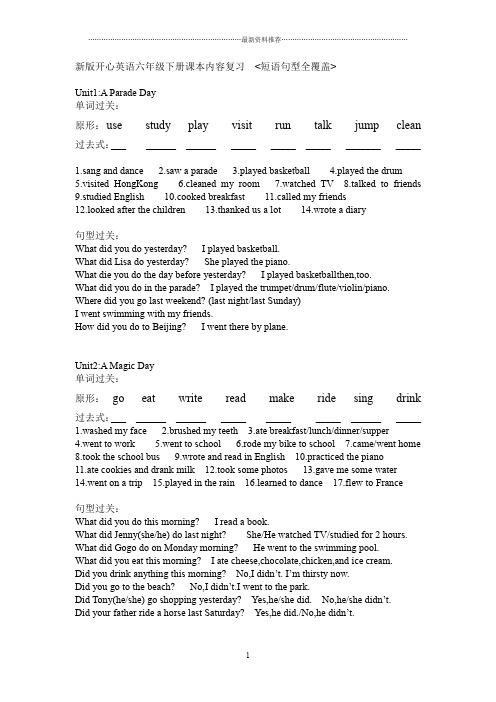
新版开心英语六年级下册课本内容复习<短语句型全覆盖>Unit1:A Parade Day单词过关:原形:use study play visit run talk jump clean 过去式:___ ______ ______ _____ _____ _____ _______ _____1.sang and dance2.saw a parade3.played basketball4.played the drum5.visited HongKong6.cleaned my room7.watched TV8.talked to friends9.studied English 10.cooked breakfast 11.called my friends12.looked after the children 13.thanked us a lot 14.wrote a diary句型过关:What did you do yesterday? I played basketball.What did Lisa do yesterday? She played the piano.What die you do the day before yesterday? I played basketballthen,too.What did you do in the parade? I played the trumpet/drum/flute/violin/piano. Where did you go last weekend? (last night/last Sunday)I went swimming with my friends.How did you do to Beijing? I went there by plane.Unit2:A Magic Day单词过关:原形:go eat write read make ride sing drink过去式:___ ______ ______ _____ _____ _____ ______ _____ 1.washed my face 2.brushed my teeth 3.ate breakfast/lunch/dinner/supper4.went to work5.went to school6.rode my bike to school7.came/went home8.took the school bus9.wrote and read in English 10.practiced the piano11.ate cookies and drank milk 12.took some photos 13.gave me some water 14.went on a trip 15.played in the rain 16.learned to dance 17.flew to France句型过关:What did you do this morning? I read a book.What did Jenny(she/he) do last night? She/He watched TV/studied for 2 hours. What did Gogo do on Monday morning? He went to the swimming pool.What did you eat this morning? I ate cheese,chocolate,chicken,and ice cream.Did you drink anything this morning? No,I didn’t. I’m thirsty now.Did you go to the beach? No,I didn’t.I went to the park.Did Tony(he/she) go shopping yesterday? Yes,he/she did. No,he/she didn’t.Did your father ride a horse last Saturday? Yes,he did./No,he didn’t.Unit3:A Lucky Day单词短语过关:1.won(win) the game2.ate(eat) some cotton candy3.had(have) fun with friends4.got(get) a gift 7.woke(wake) up late 8.missed(miss) the bus 9.forgot(forget) my homework 10.lost(lose) my keys 11.had a great day 12.woke up early 13.wrote a book/an article 14.talked about her life 15.read this book16.became deaf and blind 17.could not hear or see 18.helped her to talk19.learned to write/read 20.nineteen months old句型过关:What happened? I had a lucky/great/ happy/bad/funny day.What happened to the girl? She woke up late this morning.What happened to Xiaohui yesterday? She didn’t have breakfast.First, I had fun with my friends.Next, I won the game.After that, Igot a nice gift. Wow, You’re really lucky.What happened(to you)?/What’s wrong(with you)?/What’s the matter (with you)? What a great day!/How great(the day is)!Yesterday was a bad day for me!I had a good and bad day.Review1:1.lost his keys2.had a cold3.woke up early4.went to the beach5.rode a bike6.read a book7.played tennis8.studied English/Chinese/Japanese9.cleaned up the window 10.drank some juice 11.sang songs 12.got a nice gift 13.had fun with friends 14.won the game 15.wrote a letter to her friends 16.played his toy car 17.had a cold/fever 18.played the violin 19.went home at eleven o’clock 20.ate some salad 21.watered the flowers 22.swept(sweep)the floor 23.helped Dad wash the car 24.worked on a farm 25.a big wolf jumped out Where did you go last Sunday? I went to the park.What did you do? I had fun with friendsLast Sunday,I went to the park. First, I rode my bike. Next, I played tennis with friends. After that, I flew(fly) kites with them.Unit4:Felling Excited单词短语过关:tired scared excited sad happy bored interested outgoing angry1.stayed up late2.heard a noise3.got a kitten4.got a poor/good grade5.stayed in bed6.stayed up late7.watched a football game8.saw a mouse9.missed the subway 10.washed the clothes 11.went into the living room12.was scared 13.wasn’t scared at all 14.was excited and hungry 15.walked to the kitchen 16.wanted some milk and cookies 17.looked around18.a red and white hat 19.was tired 20.Christmas day 21.lost my cat22.came out 23.climbed up the mountain 24.sat in my plane 25.flew up to cloud 26.visited the Panda Base in Sichuan 27.saved the pandas 28.take care ofUnit5:Being Helpful单词短语过关:1.turn on the light(s)2.turn off the TV/computer3.turn down the radio4.put away your books5.take out your notebook6.take out the trash7.put on your jacket8.put off your coat 9.try on .hang up your clothes 10.hang up your clothes 11.clean up the room 12.clean them up later/in a minute 13.take it out 14.be proud of 15.put away your toys (put them away)for you 16.washing the dishes 17.sweeping the floor 18.cleaning up my room 19.watering the plants 20.keep your room tidy 21.put away your shoes22.clean things up before we go 23.not any more 24.put the trash in a bag.25.take it outsidemy/your/his/her/its/our/their/yourright now in a minute at once later just now句型过关:Can you take out the trash,please? Sure,I’ll take it out. I’m proud of you.Can you hang up my clothes? Sure,I’ll hang them up in a minute/right now/at once. Oh,Gogo,I’m proud of you.Can you clean up my room,please? Sorry.I’m busy now.It’s time to clean up.=It’s for cleaning up.It’s time to have lunch.=It’s for lunch.Where should I put this cup? Put it on the table.Which one do you like? The red one.How/What about the pencil? How/What you?What do you want me to do with that paper over there?You can throw it away.I don’t need it any more.Unit6:Feeling Fun单词短语过关:原形:lose carry push pull give find drop get过去式:____ ______ ______ _____ _____ _____ _______ _____ 1.lost my bag/cheese 2.don’t worry 3.hurry up 4.can’t go out 5.will come back soon 6.must be careful 7.dangerous/safe 8.drop your club 9.don’t fight 10.be afraid of 11.our play is over 12.dropped my bag 13.pushed my horse 14.go forward 15.go back 16.Tangseng /Monkey King /Pigsy /Sandy 17.White-Bone Monster 18.go the West 19.came to a big mountain20.were hungry and thirsty 22.drew a magic circle 23.on the ground24.went away for food 25.turned into a pretty girl 26.leave the circle27.at that moment 28.didn’t give up 29.so that 30.poured a cup of tea 31.a long journey to the West 32.many years ago 33.get some important books 34.bring(brought) them back to China 35.made problems gor him 36.in the end 37.learnd from Tangseng 38.worked very hard 39.help me a lot40.everyone got some very special presents 41.studied many books and he was very wise 42.watched me 43.climbed a tree 44.jumped on the car 45.played with me 46.across from句型过关:Oh,no! I lost my bag! I can’t find it. Don’t worry. I’ll help you.We must hurry up. Oh,no!We can’t go out. Don’t push.You must pull!What must she do? She must find her dog.What will she do? She’ll find her keys.(she’ll=she will)What is she doing? She is pulling the dog.What happened? She got a present from her parents.Where is the chair? The chair is on the stairs.Review2:1.did my homework2.went to the park3.stayed up late4.watched TV5.heard a noise6.saw a snake7.saw a dentist8.saw a movie9.got a poor grade 10.lost my keys 11.had a cold 12.dropped my glasses 13.got a good grade 14.won the game 15.got a present 16.went on vacation 17.had a birthday party 18.played computer games 19.had fun with friends20.played basketball/football/soccer/volleyball/badminton/tennis/ping-pongHe ‘s scared because he saw a snake.He must pull the door.Can you help me fold the clothes?He’s going to wash the dishes.Can you take out your notebook?How did you feel last weekend? I was tired.What did you do? I played basketball and stayed up late.。
六年级开心版英语知识点

六年级开心版英语知识点一、名词(Nouns)名词是用来表示人、动物、事物、地方、时间等具体或抽象概念的词语。
在英语中,名词通常用来作主语、宾语等。
1. 可数名词(Countable Nouns)可数名词可以用来表示一个或多个个体的名词,可以用数字进行计数。
例如:dog(狗)、apple(苹果)、book(书)等。
2. 不可数名词(Uncountable Nouns)不可数名词用来表示无法进行数的名词,无法用数字进行计数。
例如:milk(牛奶)、water(水)、rice(米饭)等。
二、动词(Verbs)动词是用来表示行为、动作、状态或存在的词语。
在英语中,动词根据不同的时态和语态来表达不同的意思。
1. 现在时态(Present Tense)现在时态用来表示现在正在进行或经常性发生的动作或状态。
常见的现在时态动词有:play(玩)、study(学习)、like(喜欢)等。
2. 过去时态(Past Tense)过去时态用来表示过去发生的动作或状态。
在一般情况下,过去时态动词要在词尾加上-ed。
例如:played(玩过)、studied(学习过)、liked(喜欢过)等。
3. 将来时态(Future Tense)将来时态用来表示将来将要发生的动作或状态。
常见的将来时态动词有:will go(将要去)、shall study(将要学习)、am/is/are going to play(将要玩)等。
三、形容词(Adjectives)形容词用来描述或修饰名词,表示名词的性质、特征或状态。
形容词一般位于名词之前。
1. 基本形容词(Basic Adjectives)基本形容词表示普通或基本性质的形容词。
例如:big(大)、small(小)、happy(快乐)等。
2. 比较级形容词(Comparative Adjectives)比较级形容词用来比较两个事物的大小、程度或质量等。
一般在形容词后面加上-er,或在形容词前面加上more。
- 1、下载文档前请自行甄别文档内容的完整性,平台不提供额外的编辑、内容补充、找答案等附加服务。
- 2、"仅部分预览"的文档,不可在线预览部分如存在完整性等问题,可反馈申请退款(可完整预览的文档不适用该条件!)。
- 3、如文档侵犯您的权益,请联系客服反馈,我们会尽快为您处理(人工客服工作时间:9:00-18:30)。
新版开心英语六年级下册课本内容复习<短语句型全覆盖>Unit1:A Parade Day单词过关:原形:use study play visit run talk jump clean 过去式:___ ______ ______ _____ _____ _____ _______ _____1.sang and dance2.saw a parade3.played basketball4.played the drum5.visited HongKong6.cleaned my room7.watched TV8.talked to friends9.studied English 10.cooked breakfast 11.called my friends12.looked after the children 13.thanked us a lot 14.wrote a diary句型过关:What did you do yesterday? I played basketball.What did Lisa do yesterday? She played the piano.What die you do the day before yesterday? I played basketballthen,too.What did you do in the parade? I played the trumpet/drum/flute/violin/piano. Where did you go last weekend? (last night/last Sunday)I went swimming with my friends.How did you do to Beijing? I went there by plane.Unit2:A Magic Day单词过关:原形:go eat write read make ride sing drink过去式:___ ______ ______ _____ _____ _____ ______ _____ 1.washed my face 2.brushed my teeth 3.ate breakfast/lunch/dinner/supper4.went to work5.went to school6.rode my bike to school7.came/went home8.took the school bus9.wrote and read in English 10.practiced the piano11.ate cookies and drank milk 12.took some photos 13.gave me some water 14.went on a trip 15.played in the rain 16.learned to dance 17.flew to France句型过关:What did you do this morning? I read a book.What did Jenny(she/he) do last night? She/He watched TV/studied for 2 hours. What did Gogo do on Monday morning? He went to the swimming pool.What did you eat this morning? I ate cheese,chocolate,chicken,and ice cream.Did you drink anything this morning? No,I didn’t. I’m thirsty now.Did you go to the beach? No,I didn’t.I went to the park.Did Tony(he/she) go shopping yesterday? Yes,he/she did. No,he/she didn’t.Did your father ride a horse last Saturday? Yes,he did./No,he didn’t.Unit3:A Lucky Day单词短语过关:1.won(win) the game2.ate(eat) some cotton candy3.had(have) fun with friends4.got(get) a gift 7.woke(wake) up late 8.missed(miss) the bus 9.forgot(forget) my homework 10.lost(lose) my keys 11.had a great day 12.woke up early 13.wrote a book/an article 14.talked about her life 15.read this book16.became deaf and blind 17.could not hear or see 18.helped her to talk19.learned to write/read 20.nineteen months old句型过关:What happened? I had a lucky/great/ happy/bad/funny day.What happened to the girl? She woke up late this morning.What happened to Xiaohui yesterday? She didn’t have breakfast.First, I had fun with my friends.Next, I won the game.After that, Igot a nice gift. Wow, You’re really lucky.What happened(to you)?/What’s wrong(with you)?/What’s the matter (with you)? What a great day!/How great(the day is)!Yesterday was a bad day for me!I had a good and bad day.Review1:1.lost his keys2.had a cold3.woke up early4.went to the beach5.rode a bike6.read a book7.played tennis8.studied English/Chinese/Japanese9.cleaned up the window 10.drank some juice 11.sang songs 12.got a nice gift 13.had fun with friends 14.won the game 15.wrote a letter to her friends 16.played his toy car 17.had a cold/fever 18.played the violin 19.went home at eleven o’clock 20.ate some salad 21.watered the flowers 22.swept(sweep)the floor 23.helped Dad wash the car 24.worked on a farm 25.a big wolf jumped out Where did you go last Sunday? I went to the park.What did you do? I had fun with friendsLast Sunday,I went to the park. First, I rode my bike. Next, I played tennis with friends. After that, I flew(fly) kites with them.Unit4:Felling Excited单词短语过关:tired scared excited sad happy bored interested outgoing angry1.stayed up late2.heard a noise3.got a kitten4.got a poor/good grade5.stayed in bed6.stayed up late7.watched a football game8.saw a mouse9.missed the subway 10.washed the clothes 11.went into the living room12.was scared 13.wasn’t scared at all 14.was excited and hungry 15.walked to the kitchen 16.wanted some milk and cookies 17.looked around18.a red and white hat 19.was tired 20.Christmas day 21.lost my cat22.came out 23.climbed up the mountain 24.sat in my plane 25.flew up to cloud 26.visited the Panda Base in Sichuan 27.saved the pandas 28.take care ofUnit5:Being Helpful单词短语过关:1.turn on the light(s)2.turn off the TV/computer3.turn down the radio4.put away your books5.take out your notebook6.take out the trash7.put on your jacket8.put off your coat 9.try on .hang up your clothes 10.hang up your clothes 11.clean up the room 12.clean them up later/in a minute 13.take it out 14.be proud of 15.put away your toys (put them away)for you 16.washing the dishes 17.sweeping the floor 18.cleaning up my room 19.watering the plants 20.keep your room tidy 21.put away your shoes22.clean things up before we go 23.not any more 24.put the trash in a bag.25.take it outsidemy/your/his/her/its/our/their/yourright now in a minute at once later just now句型过关:Can you take out the trash,please? Sure,I’ll take it out. I’m proud of you.Can you hang up my clothes? Sure,I’ll hang them up in a minute/right now/at once. Oh,Gogo,I’m proud of you.Can you clean up my room,please? Sorry.I’m busy now.It’s time to clean up.=It’s for cleaning up.It’s time to have lunch.=It’s for lunch.Where should I put this cup? Put it on the table.Which one do you like? The red one.How/What about the pencil? How/What you?What do you want me to do with that paper over there?You can throw it away.I don’t need it any more.Unit6:Feeling Fun单词短语过关:原形:lose carry push pull give find drop get过去式:____ ______ ______ _____ _____ _____ _______ _____ 1.lost my bag/cheese 2.don’t worry 3.hurry up 4.can’t go out 5.will come back soon 6.must be careful 7.dangerous/safe 8.drop your club 9.don’t fight 10.be afraid of 11.our play is over 12.dropped my bag 13.pushed my horse 14.go forward 15.go back 16.Tangseng /Monkey King /Pigsy /Sandy 17.White-Bone Monster 18.go the West 19.came to a big mountain20.were hungry and thirsty 22.drew a magic circle 23.on the ground24.went away for food 25.turned into a pretty girl 26.leave the circle27.at that moment 28.didn’t give up 29.so that 30.poured a cup of tea 31.a long journey to the West 32.many years ago 33.get some important books 34.bring(brought) them back to China 35.made problems gor him 36.in the end 37.learnd from Tangseng 38.worked very hard 39.help me a lot40.everyone got some very special presents 41.studied many books and he was very wise 42.watched me 43.climbed a tree 44.jumped on the car 45.played with me 46.across from句型过关:Oh,no! I lost my bag! I can’t find it. Don’t worry. I’ll help you.We must hurry up. Oh,no!We can’t go out. Don’t push.You must pull!What must she do? She must find her dog.What will she do? She’ll find her keys.(she’ll=she will)What is she doing? She is pulling the dog.What happened? She got a present from her parents.Where is the chair? The chair is on the stairs.Review2:1.did my homework2.went to the park3.stayed up late4.watched TV5.heard a noise6.saw a snake7.saw a dentist8.saw a movie9.got a poor grade 10.lost my keys 11.had a cold 12.dropped my glasses 13.got a good grade 14.won the game 15.got a present 16.went on vacation 17.had a birthday party 18.played computer games 19.had fun with friends20.played basketball/football/soccer/volleyball/badminton/tennis/ping-pongHe ‘s scared because he saw a snake.He must pull the door.Can you help me fold the clothes?He’s going to wash the dishes.Can you take out your notebook?How did you feel last weekend? I was tired.What did you do? I played basketball and stayed up late.。
